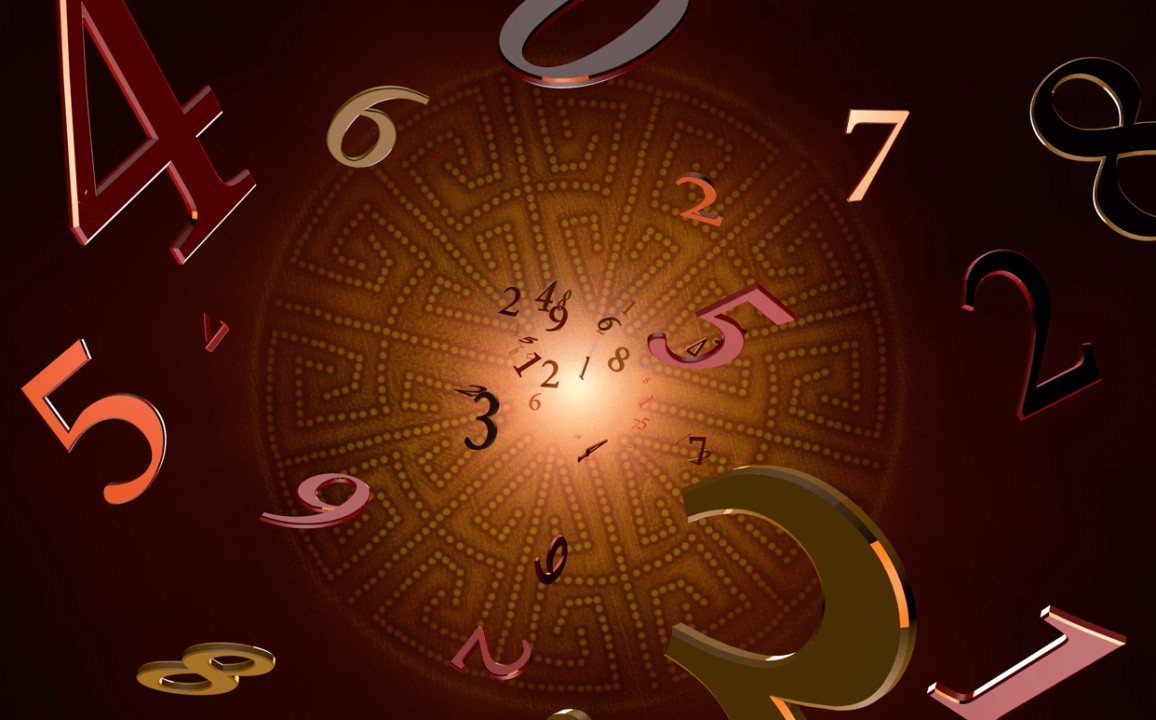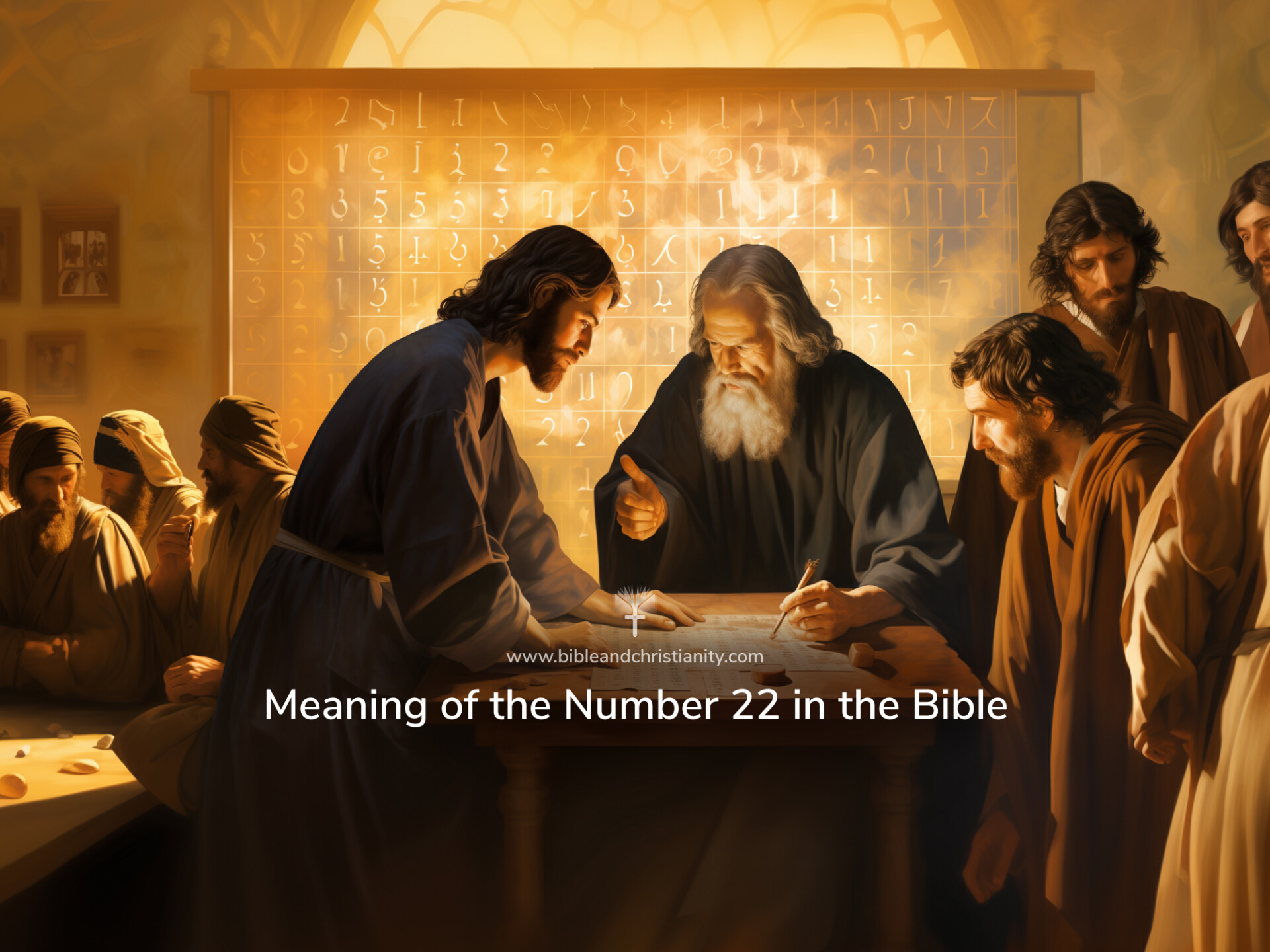Understanding the Number 22 Meaning in the Bible’s Context
The number 22 meaning in the Bible is an interesting topic for study. Numbers play a critical role in our day-to-day lives. Telling the time, counting money, measuring ingredients for a recipe, and a thousand other ordinary tasks weave numbers into the fabric of our existence. Their importance is inherent, but did you know they can also play a part in your faith?
Numbers convey more than their literal numerical value in many parts of Scripture. God uses symbols and patterns to reveal important teachings. They range from the prophetic messages in Daniel and Revelations to Jesus’ parables in the gospels.
Biblical numerology is the study of these special numbers that God uses to portray deeper theological meaning. Understanding their significance helps us learn more about the Lord’s will and designs for humanity.
Number 22’s meaning is not explicitly stated in the Bible. Scriptural symbols are not always explained directly. Sometimes, context clues, historical data, and extrapolation guide our understanding. That means, to understand the Biblical meaning of 22, Christians must first learn to approach symbolism with discernment.
The whole is greater than the sum of its parts. Numbers contain no spiritual power beyond the meaning God expresses through them. Ultimately, we must trust the Holy Spirit to guide our critical thinking.
Let’s take a closer look at what is the biblical meaning of the number 22?
What does 22 Mean in the Bible
There are a few possible explanations we can examine using different interpretive approaches.
Disorder
The first possible number 22 meaning is chaotic disorder. The number 22 is a multiple of 11, which also means disorder. Double it, and the meaning is amplified.
There are several reasons why 11, and therefore 22, is attributed this way. Since 11 follows 10, which is said to represent law and responsibility, it’s considered its opposite. Second, Genesis 11 tells the story of the Tower of Babel, a rebellious act. God punished them by confusing their language, resulting in mass confusion and chaos. John sees 11 signs connected with the final judgment (Revelation 20:11-14).
These examples point to discord in their contexts.Another way the number 22 in the Bible gets its definition is from the number two’s meaning. Though “two” can represent partnership, such as in a marital union, it can also represent division. Jesus tells us in Mark 3:25, “If a house is divided against itself, that house cannot stand.”
Other dichotomies, like good versus evil or darkness versus light, further this imagery. So, in the case of 22, since the single digit is repeated, it magnifies the singular meaning. The disorder is amplified.
Unity
The number 22 in the Bible can also mean unity. Since the number two has dual meanings, so does the number 22. If 22 amplifies disorder, it also amplifies unity. The number two focuses on positive pairings, too. Complementary or unified pairs produce positive imagery throughout Scripture.
In Genesis 2, God saw that Adam needed a partner. He created Eve and instituted marriage. Marriage is a significant symbol throughout the Bible. It’s especially poignant that Jesus uses it to portray His relationship with the church. To take this a step further, the 22nd book of the Bible is the Song of Songs.
This book is both a literal and symbolic portrayal of a marital union. The literal portrayal features Solomon and his new wife. Symbolically, however, this union represents the love between God and the church.
Noah’s Ark portrays positive pairs as well. When God planned to destroy the earth, He commanded Noah to take animals on the ark. “Clean animals, unclean animals, birds, and everything that creeps on the ground went by pairs to Noah into the ship, male and female, as God commanded Noah.” (Genesis 7:8-9). The Bible’s sections are also a unified pair, the Old and New Testaments. These represent the old covenant and the new covenant (Hebrews 8:13). Therefore, based on numerological principles, pairing two and two to create 22 magnifies unity.
God’s Sovereignty
Another number 22 meaning in the Bible is God’s sovereignty. God created 22 things in the six days of creation. The Hebrew alphabet also contains 22 letters. The entire Old Testament is an arrangement of these figures. For many centuries, this was the only language that contained the revelation of God. God’s will was originally expressed through Hebrew, connecting the alphabet and the significance of 22.
There are also 22 Bible chapters in the Book of Revelation. That book is the final earthly expression of God’s plan for humanity. Evil is destroyed. The New Jerusalem settles on the “new earth.” The 22nd chapter foretells when God’s sovereignty over all beings will be reinstated for eternity.
Lastly, Matthew 22 heralds back to six Old Testament passages. Most of those instances are from the first five books of the Bible. Those books are considered the foundation of the Jewish faith. Here are the verses alluded to or referenced in order of occurrence:
- Deuteronomy 25:5
- Exodus 3:6
- Deuteronomy 6:5
- Leviticus 19:18
- Exodus 20:12-16
- Psalm 110:1
Light
A fourth number 22 meaning in the Bible is light. God’s revelation is also referred to as God’s light. That means all the connections for the Book of Revelation apply to this definition. The Gospel of John offers more evidence as well. The word “light” is mentioned 22 times throughout the book. The 22nd and final reference is a direct quotation of Jesus describing Himself as the light: “Again, therefore, Jesus spoke to them, saying, ‘I am the light of the world. He who follows me will not walk in the darkness, but will have the light of life.’” (John 8:12). Furthermore, the imagery Jesus uses is in alignment with opposing forces of darkness and light, another symbolic meaning for 22.
Another case for number 22 meaning light is the number of overall occurrences of the word in Scripture. It appears 264 times. When you divide 264 by 12, a number associated with divine authority, the result is 22.
The Significance of 22 in the Bible
When we examine the Bible for the significance of 22, the context of where it shows up plays an important role in our interpretation. Let’s examine additional occurrences of 22, their context, and their possible meanings throughout Scripture.
Generations From Adam to Jacob
Genealogy was important to the Israelites. It’s still important to Jewish culture today. Lineage was quintessential to the Israelite tribal system, where the sons (and two grandsons) of Jacob led the twelve factions of Israel. Each tribe received a portion of the promised land, except for the Levites. They became God’s priests and temple workers.
Knowing where you fit in that structure was paramount in their culture. It was also a source of great pride. Guess how many generations there were from Adam to Jacob, the father of these tribes of Israel. That’s right – 22.
Speaking of tribes, when Moses constructed the Tabernacle, God instructed him to conduct a census. Levi, the tribe responsible for priestly duties, totaled 22,000 males one month or older (Numbers 3:39).
Acrostic Passages and the Hebrew Alphabet
Psalm 119 is an acrostic poem of the Hebrew alphabet. An acrostic poem starts each line with a letter that then spells out a word or the alphabet. So, Psalm 119 contains 22 sections for each letter of the Hebrew alphabet. Each section contains eight lines. All eight lines start with the corresponding letter. This makes Psalm 119 the longest Psalm and chapter in the entire Bible.
The word “commandment” appears 22 times in the Psalm. Those commands carry weight because of God’s sovereignty. The content of the Psalm focuses primarily on God’s Word, or His revelation, which also plays into God’s sovereignty and the Book of Revelation’s 22 chapters.
Lamentations 3 is another acrostic passage. Its meaning, however, swings more toward discord. In this book, the author laments his disconnection from God. He uses opposites to describe his sorry state. “He has led me and caused me to walk in darkness, and not in light.” (verse 2). The passage also shows two sides of God. On the one hand, He punishes Israel for its sins. That’s the first half of the chapter. The second half, however, describes how God will redeem His people.
Rulers of Israel and Judah
Several judges and kings had ties to the number 22 as well. The meanings aren’t immediately discernable but interesting to note. Here are some facts associated with rulers of Israel and Judah:
- Jair judged Israel from 1079 to 1057 BC, a total of 22 years.
- Jeroboam I reigned 22 official years over Israel after it was divided in 930 BC.
- Abijah, King Solomon’s grandson, had 22 sons (2 Chronicles 13:21).
- King Ahaziah of Judah started his reign at 22 years old. He ruled for three months before Jehu usurped the throne (2 Kings 8:26).
- King Ahab, notoriously the worst ruler in Israel, reigned for 22 years.
- Amon, another notoriously evil king, began his reign at 22 (2 Kings 21:19).
The Number 22 in the Bible
When we look at the Bible as a manuscript filled with chapters and verses, we see the number listed and referenced in numerous places. For instance, 1 Kings and Revelation have 22 chapters apiece. These are books and chapters that contain 22 verses:
- Genesis 6, 8, 28, 48
- Exodus 1, 3, 13
- Numbers 19
- Deuteronomy 10, 16, 18, 24
- Ruth 1, 4
- 1 Samuel 4, 8, 24
- 2 Samuel 21
- 2 Chronicles 4, 7, 13
- Ezra 6
- Esther 1
- Job 1, 8, 10, 14, 16, 32
- Psalm 25, 33, 34, 38, 103
- Proverbs 2
- Ecclesiastes 2
- Isaiah 2, 8, 13, 36, 38, 48, 60
- Jeremiah 8, 14, 27, 34, 42
- Lamentations 1, 2, 4, 5
- Ezekiel 10
- Ephesians 2
- 2 Timothy 4
- 1 Peter 3
- 2 Peter 2
- Revelation 3
Jesus and the Number 22
Did Jesus’ life connect to the number 22? Jesus quoted Psalm 22 on the cross. “At the ninth hour Jesus cried with a loud voice, saying, ‘Eloi, Eloi, lama sabachthani?’ which is, being interpreted, ‘My God, my God, why have you forsaken me?’” (Mark 15:34).
The 22nd Psalm didn’t just inform Jesus’ final words. It is a Messianic psalm. That means it foretold aspects of His death. The Psalmist writes in verse 7, “All those who see me mock me.
They insult me with their lips. They shake their heads…” This was exactly how the onlookers treated Jesus at His crucifixion. “The people stood watching. The rulers with them also scoffed at him, saying, ‘He saved others. Let him save himself, if this is the Christ of God, his chosen one!’ The soldiers also mocked him…” (Luke 23:35-36).
Psalm 22:14-18 also reads, “I am poured out like water. All my bones are out of joint. My heart is like wax. It is melted within me. My strength is dried up like a potsherd. My tongue sticks to the roof of my mouth. You have brought me into the dust of death. For dogs have surrounded me. A company of evildoers have enclosed me. They have pierced my hands and feet. I can count all of my bones. They look and stare at me. They divide my garments among them. They cast lots for my clothing.”
These things happened to Jesus. When He died, they pierced His side, and blood and water poured out (John 19:34). Jesus cried out that He was thirsty (John 19:28). They pierced His hands and feet (Luke 24:39). His entire being was on display during the crucifixion, and they cast lots for His clothing (Matthew 27:35). What a powerful fulfillment of God’s plan for salvation. This tie between the number 22 and Jesus may be the most significant one of all.
The History of Numerology
Numerology’s history helps us to put the practice into its proper context as we apply it to the Bible and the significance of 22. Understanding its origins helps us to discern its proper use and potential pitfalls. The Bible is an ancient text, which tells us that the concept is at least 2,500 years old. It’s not just a Biblical philosophy, however. Many non-Christian cultures and religions also attribute meanings to numerical values. Versions of its ideology link back to many ancient civilizations, such as the Egyptians, Babylonians, and Mayans.
Pythagoras, a Greek philosopher who lived in 500 BC, is credited with originating modern numerology. He and his followers, the Pythagoreans, shared a fascination with mathematics. Their work led to many critical discoveries, such as the Pythagorean theorem, the mathematical properties of musical harmony, and Pythagoras’ constant.
In their minds, these patterns were too perfect to be coincidence. So, the Pythagoreans delved into numeric mysticism. Their exploration led them to believe that “all is number” or that all things can be explained and measured in numbers and proportions. They mixed mathematics, geometry, mystic ideals, intuition, and even astronomy to construct a spiritual framework.

Hebrew mystics adopted numerology principles in 200 AD. It became crucial to Kabbalah or the Jewish mystical tradition. The originators dubbed it “gematria,” from the Greek “geometria.” It first appeared as one of the 32 rules prescribed for Bible interpretation.
The mythic properties of numerology pervade culture even in modern times. For instance, people are superstitious about the number 13. While some people find it ominous, others consider it “lucky number 13.” In 2007, Jim Carrey starred in the film The Number 23, which portrayed a man’s obsession with the titular number and its inexplicable connection to his life. Astrologists define people’s distinguishing characteristics and personalities based on birth dates and other astrological signs. Some even believe that numbers add power to the temporal world.
These practices deviate from God’s intention for spiritual symbolism. While there is a Biblical way to decipher numbers, believers must be aware that there is a fine line between Bible study and sinful spiritualism.
The Spiritual Dangers of Numerology
Discerning spiritual significance is not the same as attributing spiritual power. This is one of the most important distinctions between routine and Biblical numerology. Many numerology proprietors believed that numbers themselves contained a supernatural element that could be used for divination and other spiritualistic practices. God expressly forbids these practices.
In Deuteronomy 18:10-12, the Lord commands Israel, “There shall not be found with you anyone who makes his son or his daughter to pass through the fire, one who uses divination, one who tells fortunes, or an enchanter, or a sorcerer, or a charmer, or someone who consults with a familiar spirit, or a wizard, or a necromancer. For whoever does these things is an abomination to Yahweh. Because of these abominations, Yahweh your God drives them out from before you.”
John affirmed God’s instructions in Revelation 21:8 (NIV), “But the cowardly, the unbelieving, the vile, the murderers, the sexually immoral, those who practice magic arts, the idolaters and all liars–they will be consigned to the fiery lake of burning sulfur. This is the second death.” Using numbers to access supernatural power is akin to what the Bible labels sorcery, witchcraft, and magic arts. Numbers don’t possess power. They represent or reveal God’s power. We must keep this difference in mind if we are to safely use numerology to interpret Scripture and decipher the Biblical meaning of 22.
Methods for Interpreting Biblical Numerology
When interpreting numbers in the Bible, let’s discuss several clues that help us discern their meaning and significance:
Repetition
People repeat important things. Scripture does, too. We can allude that numbers appearing frequently and in multiple contexts are noteworthy. For instance, the Bible frequently uses numbers 1, 3, 7, 12, and 40.
Association
A number’s association can also give it meaning. For instance, there are three members of the Godhead or Trinity. Together, they represent one God, which is equated with wholeness. Another example is creation. The Lord finished His creative work in seven days. Therefore, seven symbolizes completion.
Usage
Numbers can be literal, symbolic, or both. It depends on how they’re used. For instance, Genesis 5:32 says, “Noah was five hundred years old, then Noah became the father of Shem, Ham, and Japheth.” The number 500’s meaning is no more than its numerical value. However, when the Lord prophesies in Daniel 12:12 that, “Blessed is he who waits, and comes to the one thousand three hundred thirty-five days,” he doesn’t mean a literal number of days.
Historical and Cultural Significance
Just like in modern times, social, cultural, and environmental factors informed which symbols Biblical writers used to interpret spiritual truths. For instance, the number 12 is significant because there were 12 tribes of Israel, a distinct part of Jewish heritage.
- Related Topic : Spiritual Meaning of Colors in the Bible
The Significance of 22 for Christians
There is no exact meaning for the number 22 in the Bible. It also contains no supernatural force for luck, blessings, or curses. Its ultimate purpose is to reveal God to us. By examining the significance of 22 throughout Scripture, we delve deeper into God’s word. That’s one of the surest ways of drawing closer to Him.
Learning Biblical numerology may inspire you to explore the symbolism of many numbers. Prayerfully consider where God wants to take you next. Soon, you may find yourself reading many passages of God’s holy Scriptures. What a fascinating way to spend more time with the Lord and a beautiful way to enrich our faith.

